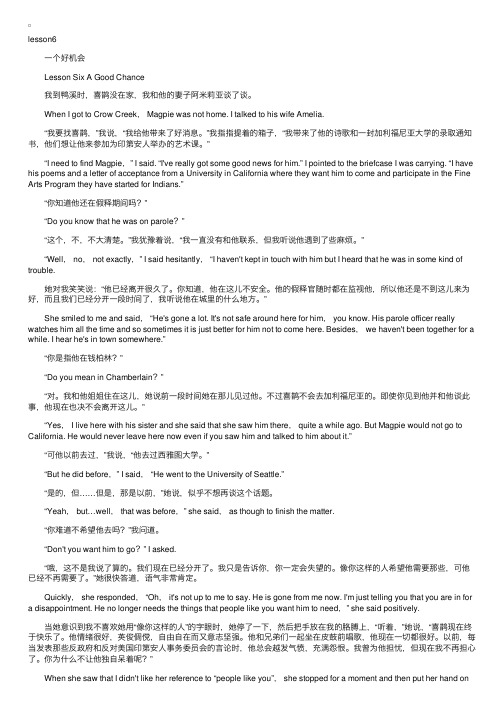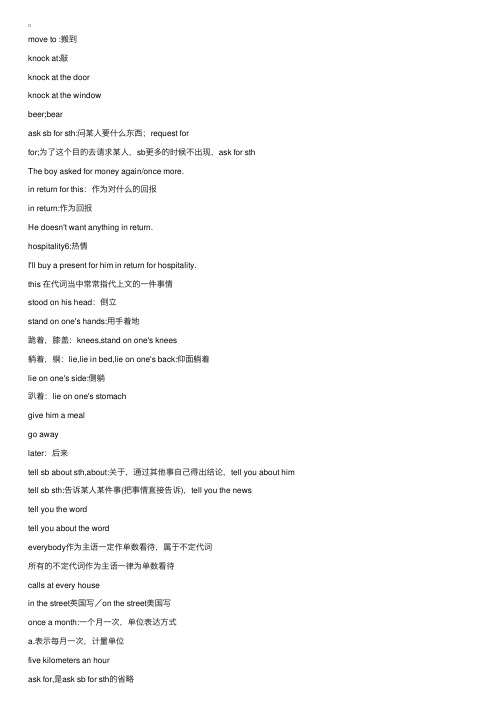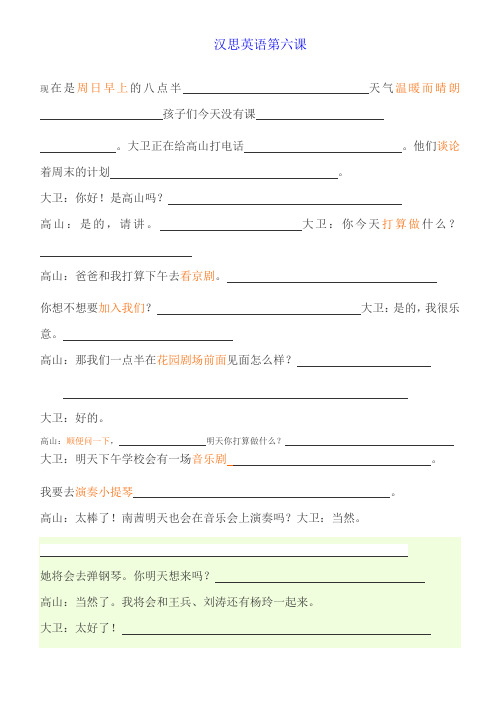Lesson 6 语境与汉英词语翻译
《高级英语》课文逐句翻译(6)

lesson6 ⼀个好机会 Lesson Six A Good Chance 我到鸭溪时,喜鹊没在家,我和他的妻⼦阿⽶莉亚谈了谈。
When I got to Crow Creek, Magpie was not home. I talked to his wife Amelia. “我要找喜鹊,”我说,“我给他带来了好消息。
”我指指提着的箱⼦,“我带来了他的诗歌和⼀封加利福尼亚⼤学的录取通知书,他们想让他来参加为印第安⼈举办的艺术课。
” “I need to find Magpie,” I said. “I've really got some good news for him.” I pointed to the briefcase I was carrying. “I have his poems and a letter of acceptance from a University in California where they want him to come and participate in the Fine Arts Program they have started for Indians.” “你知道他还在假释期间吗?” “Do you know that he was on parole?” “这个,不,不⼤清楚。
”我犹豫着说,“我⼀直没有和他联系,但我听说他遇到了些⿇烦。
” “Well, no, not exactly,” I said hesitantly, “I haven't kept in touch with him but I heard that he was in some kind of trouble. 她对我笑笑说:“他已经离开很久了。
你知道,他在这⼉不安全。
他的假释官随时都在监视他,所以他还是不到这⼉来为好,⽽且我们已经分开⼀段时间了,我听说他在城⾥的什么地⽅。
新概念lesson 6

不用任何冠词情况(零冠词)
在专有名词、物质名词和抽象名词前一般不用冠词 This kind of machine is made in China. Glass can be made into bottles. without hesitation/delay/mercy 在表示一类人或事物的复数名词前,一般不用冠词 She likes reading stories. They are all teachers. Children like holidays.
take off起飞;脱下;动身;匆匆离开 take on承担;呈现;同…较量;开始雇用 take over接受;接管;借用;接办 take down记下;拆卸;记下来;取下 take place发生;进行;举行;产生 take apart拆卸;拆开;分辨;区分 take a break休息一会儿 take a hand in干预,参与,手;帮助 take away带走,拿走,取走 take care of照顾;注意;抚养 take possession of占有;占领
冠词的分类 冠词分为不定冠词“a,an”、定冠词“the”和零冠词 "(/)"三种,零冠词指的是不用冠词的情况。 不定冠词表示泛指、类指,定冠词表示特指、专 指、类指,零冠词表示泛指人或事物、类指。a、an, 仅用在单数可数名词前来表示“一”的意义,但不强 调数目概念,只表示名词为不特定者。定冠词the,表 示名词的特定者,表示“这”·“那”·“这些”·“那些”, 用在可数名词单数、复数,不可数名词前均可。(/)则 表示名词化的其他词或专有名词,因此单数复数均可。
不定冠词的基本用法: : • 1 用来表示“一”这个数量,意思和 用来表示“ 这个数量,意思和one差不多 差不多 Rome was not built in a day. The work will be finished in a day or two. • 2 也可以用来表示“某一个 也可以用来表示“某一个” This poem was written by a peasant. A nurse is coming to see you. • 3 代表一类人或东西 Even a child can answer this question. A horse is a useful animal. • 4 在作表语的名词前加不定冠词的情形很多,主要说明某个人或 在作表语的名词前加不定冠词的情形很多, 东西属于哪一类 The man is an engineer. Is this a book or a magazine?
上册Lesson6

Lesson Six How Dictionaries Are Made打印本页一、词汇have confidence(→<a.>confident) in 对…有信心be confident inchief editor 主编existdozen 一打fortnight= 2 week 两星期have () influence on 对某人有…的影响tape recorder 录音机all kinds/sorts of=various 各种各样的inventor 发明家,发明者二、课文分析1.课前预习:请在开始本教程之前跟着本书配套磁带朗读单词和课文2遍,大致熟悉课文内容。
2.重点句型及常用短语:(1)教材上册P122~123的常用短语必须都牢记(2) It is believed that 人们普遍认为It is said that 据说It is reported that 据报道(3) offer to doa fewHe made a few spelling mistakes in the last dictation.在上次听写中,他犯了好几个拼写错误。
Few people understand this theory.没有什么人懂得这一理论。
(5) bring up VS grow upbe willing to do sth.be out of one's mindaccording toAccording to the weather forecast, it will be fine tomorrow.look uparrive at/inapply toThe rules of safe driving apply to everyone.安全驾驶的规则适用于所有人。
Lesson SixHow Dictionaries Are Made本句翻译:字典是怎么被编写成的1 It is widely believed that every word has a correct meaning, that we learn thesemeanings mainly from teachers and grammars, and that dictionaries and grammar books are the highest authority in matters of meaning and usage.本句翻译:人们普遍认为每一个词都有一个正确的涵义,而且我们主要是通过老师和语法书来学到这些词的涵义,像字典以及语法书实际上是我们在学一个词的用法以及其涵义的最高的权威。
新概念英语第二册课文讲解lesson6PercyButtons

move to :搬到knock at:敲knock at the doorknock at the windowbeer;bearask sb for sth:问某⼈要什么东西;request forfor;为了这个⽬的去请求某⼈,sb更多的时候不出现,ask for sthThe boy asked for money again/once more.in return for this:作为对什么的回报in return:作为回报He doesn't want anything in return.hospitality6:热情I'll buy a present for him in return for hospitality.this 在代词当中常常指代上⽂的⼀件事情stood on his head:倒⽴stand on one's hands:⽤⼿着地跪着,膝盖:knees,stand on one's knees躺着,躺:lie,lie in bed,lie on one's back:仰⾯躺着lie on one's side:侧躺趴着:lie on one's stomachgive him a mealgo awaylater:后来tell sb about sth,about:关于,通过其他事⾃⼰得出结论,tell you about him tell sb sth:告诉某⼈某件事(把事情直接告诉),tell you the newstell you the wordtell you about the wordeverybody作为主语⼀定作单数看待,属于不定代词所有的不定代词作为主语⼀律为单数看待calls at every housein the street英国写/on the street美国写once a month:⼀个⽉⼀次,单位表达⽅式a.表⽰每⽉⼀次,计量单位five kilometers an hourask for,是ask sb for sth的省略Percy Buttons?a beggarHe calls at eery house in the street once a month and asks for a mealand a glass of bearKey structures】关键句型a,the和somea:单数,可数名词the:可加单数/复数,还可加不可数名词,加在什么名词前⾯都对some:只能加在不可数名词的前⾯或可数名词复数的前⾯a和the的区别a是泛指,a man;特指,the man在⽂章当中第⼀次出现名词的时候往往⽤a和an修饰,第⼆次出现的时候⽤the 在表⽰⼀种笼统感念的陈述句中可以省略a和someYesterday I bought a book,Books are not very expensive.笼统感念:某某⼀类/⼀种东西I have just drunk7 a glass of milk ,Milk is very refreshing8.I ate an apple./Apples are delicious.I like oranges.Would you like some oranges?Mrs.Jones bought a bag of flour,a bag of sugar,and some tea.She always buys flour,sugar and tea at the grocer'sa和theA man is walking towards me.The man is carrying a parcel9.The parcelis full of meat.NamesWe cannot put a or the in front of names表⽰某某⼀类⼈当中,具有这种特征当中的⼀个,a Mr.zhangSpecial Difficulties】难点某些动词的后⾯加上介词或副词以后就会改变词义,这种新的组合称作短语动词put:放,put ontake:拿⾛,take offlook:看,look at:看,look for:寻找,look afrer:照顾,look out:当⼼call,call at,call on,call in ,call back,call forknock,knock at:敲,knock off,knock over,knock outknock off:下班,He knocked off earlier.knock sth off+地点,knock the vase10 off the tableknock off:打折,knock 10% off the price.knock over,A car knocked the boy over.如果有地点,off; ⽆地点,over,I knocked the boy off the bicycle. Exercises1...out...knock out :打陨,boxer:拳击⼿在拳击场合中,把⼈*在地叫knock out2...over...⽆地点3...off...4...at...1...knock out2...knock off3...knock 10% off the price of all the goodsMultiple choice question】5...D...say说/tell告诉He says + 句⼦;He says+that+句⼦;say to sb.tell sb.+句⼦:tell sb.+that+句⼦He said to me/he told mePercy Buttons 作为从句的主语⼀个简单句只有⼀个主语⼀个动词He told me Percy Bottons was a Beggar.6..they all/all theyall of us/all of them我们所有⼈ all of us,we alleach/every 每⼀个each:强调个体;every 强调整体every adj.+n. 每⼀个(书,本,⼈等)each adj.&pron.:each adj.+n; each pron.直接作主语或者宾语every person likes...each person likes.../each likes...every 不能做主语;each 强调个体,使⽤第三⼈称单数7...once a month:每⽉⼀次,属于频率对频率提问:how often提问多久:how long提问次数:how many timesHow many times do you visit your mother each month? How long do you visit your mother?对时间提问How often do you visit your mother?对时间和次数提问How soon 多久以后How soon will you finish your Homework? Vocabulary8...out of work 失业I am out of work,/I lose my job.10...A...piece of:a piece of cheese ⼀块奶酪bit:bar:a bar of chocolate---⼀块巧克⼒bar 门闩:长条状:a bar of chocolate; a bar of soap block 块,⼀⼤块: block v.堵塞;block n.房⼦packet:⼀包a piece of.../a bit of...12...A...same age and size 同年代同样式street 两边有房⼦的街道way, on the way,in the way 挡住某⼈的路(强调⽅向)road 路的通称:road Home 通往家的路route11 路线。
牛津英语6年级 第六课 课文翻译 习题 及语法

现在是周日早上的八点半天气温暖而晴朗孩子们今天没有课。
大卫正在给高山打电话。
他们谈论着周末的计划。
大卫:你好!是高山吗?高山:是的,请讲。
大卫:你今天打算做什么?高山:爸爸和我打算下午去看京剧。
你想不想要加入我们?大卫:是的,我很乐意。
高山:那我们一点半在花园剧场前面见面怎么样?大卫:好的。
高山:顺便问一下,明天你打算做什么?大卫:明天下午学校会有一场音乐剧。
我要去演奏小提琴。
高山:太棒了!南茜明天也会在音乐会上演奏吗?大卫:当然。
她将会去弹钢琴。
你明天想来吗?高山:当然了。
我将会和王兵、刘涛还有杨玲一起来。
大卫:太好了!三.根据句意思填入单词的正确形式:1. A:What are you going to go tomorrow?B:I’m going to _______ (play) computer games.2. Wang Bing ______ (want) to go shopping with his friends.3. _____ Su Hai and Su Yang going to pick apples?4. _______ they often call their grandparents?5. We are ________ (have) supper now.6. Look ! My sister _________ ( play ) with the toy cars .7. I _______ ( get ) up at 6:30 every morning .8. Do they like ________ (swim) ?9. Tom’s mother _______ (have) a nice jacket .10. Can you _______ (make ) a paper plane for me ?四、选择填空。
( ) 1. ________ some orange juice in the bottle.A. There isB. There areC. There has( ) 3. ‘Be quite ‘means you _______ make noise here.A. shouldB. shouldn’tC. can( ) 4. —Happy birthday, David. This present is for you. —________ .A. Not at all.B. Thank youC. You’re welcome.( ) 5.I _________ a Beijing opera last year.A. seeB. watchedC. saw五.翻译句子1、A:你在劳动节准备做什么?B:我准备a paper plane去远足。
新概念英语第三册课文翻译及学习笔记:Lesson6

新概念英语第三册课文翻译及学习笔记:Lesson6【课文】The expensive shops in a famous near Piccadilly werejust opening. At this time of the morning, the arcade was almost empty. Mr. Taylor, the owner of a jewellery shop was admiring a new display. Two of his assistants had beenworking busily since eight o'clock and had only just finished. Diamond necklaces and rings had been beautifully arranged ona background of black velvet. After gazing at the display for several minutes, Mr. Taylor went back into his shop.The silence was suddenly broken when a large car, withits headlights on and its home blaring, roared down the arcade. It came to a stop outside the jeweller's. One man stayed at the wheel while two others with black stocking over their faces jumped out and smashed the window of the shopwith iron bars. While this was going on, Mr. Taylor was upstairs. He and his staff began throwing furniture out ofthe window. Chairs and tables went flying into the arcade.One of the thieves was struck by a heavy statue, but he wastoo busy helping himself to diamonds to notice any pain. The raid was all over in three minutes, for the men scrambledback into the car and it moved off at a fantastic speed. Just as it was leaving, Mr. Taylor rushed out and ran after it throwing ashtrays and vases, but it was impossible to stopthe thieves. They had got away with thousands of pounds worth of diamonds.【课文翻译】皮卡迪利大街附近的一条拱廊街道上,几家高档商店刚刚开始营业。
新概念英语第二册第六课讲解

lesson 6 Percy Buttons一、生词和短语(词汇学习)词汇学习★knockknock at 敲(门窗等) ;knock at the door 敲门knock off: 下班,He knocked off earlier.knock sth off+ 地点:把某物从某处碰翻;knock the vase off the tableknock off: 打折,knock 10% off the price. 把价格降低10%。
knock over:打翻,碰翻 A car knocked the boy over. He knocked a glass over. 他把玻璃杯打翻了。
如果有地点,off; 无地点,over,I knocked the boy off the bicycle.knock out:淘汰;击败;出局;使不省人事;The thief stuned the police in the fight. 在搏斗中,小偷把警察打昏了。
★beggar n. 乞丐beg v. 乞求;I beg your pardon?ask for : 请求得到;beg for : 乞求得到★food n. 食物不可数; a lot of food★pocket n. 衣服口袋★call v. 拜访,光顾call sb: 给某人打电话;call up sb: 给某人打电话call back: 回某人电话;Can you tell him to call back?call on sb 拜访某人;I will call on you.call at+ 地点=visit someplace 拜访某地;I will call at your Home.call out =shout, 大声喊call in sb: 招集和邀请某人;For the project,the government called in a lot of experts.二、听力(回答问题)三、课文讲解(语法)四、课后习题【课文讲解】1 、I have just moved to a house in Bridge Street. 我刚刚搬进了大桥街的一所房子。
高级英语1 lesson 6 课文翻译及词汇

课文翻译第6课马克•吐温——美国的一面镜子(节选)诺埃尔•格罗夫在大多数美国人的心目中,马克•吐温是位伟大作家,他描写了哈克•费恩永恒的童年时代中充满诗情画意的旅程和汤姆•索亚在漫长的夏日里自由自在历险探奇的故事。
的确,这位美国最受人喜爱的作家的探索精神、爱国热情、浪漫气质及幽默笔调都达到了登峰造极的程度。
但我发现还有另一个不同的马克•吐温——一个由于深受人生悲剧的打击而变得愤世嫉俗、尖酸刻薄的马克•吐温,一个为人类品质上的弱点而忧心忡忡、明显地看到前途是一片黑暗的人。
印刷工、领航员、邦联游击队员、淘金者、耽于幻想的乐天派、语言尖刻的讽刺家:马克•吐温原名塞缪尔•朗赫恩•克莱门斯,他一生之中有超过三分之一的时间浪迹美国各地,体验着美国的新生活,尔后便以作家和演说家的身分将他所感受到的这一切介绍给全世界。
他的笔名取自他在蒸汽船上做工时听到的报告水深为两口寻(12英尺)——意即可以通航的信号语。
他的作品中有二十几部至今仍在印行,其外文译本仍在世界各地拥有读者,由此可见他的享誉程度。
在马克•吐温青年时代,美国的地理中心是密西西比河流域,而密西西比河是这个年轻国家中部的交通大动脉。
龙骨船、平底船和大木筏载运着最重要的商品。
木材、玉米、烟草、小麦和皮货通过这些运载工具顺流而下,运送到河口三角洲地区,而砂糖、糖浆、棉花和威士忌酒等货物则被运送到北方。
在19世纪50年代,西部领土开发高潮到来之前,辽阔的密西西比河流域占美国已开发领土的四分之三。
1857年,少年马克•吐温作为蒸汽船上的一名小领航员踏人了这片天地。
在这个新的工作岗位上,他接触到的是各式各样的人物,看到的是一个多姿多彩的大干世界。
他完全地投身到这种生活之中,经常在操舵室里听着人们谈论民间争斗、海盗抢劫、私刑案件、游医卖药以及河边的一些化外民居的故事。
所有这一切,连同他那像留声机般准确可靠的记忆所吸收的丰富多彩的语言,后来都有机会在他的作品中得以再现。
